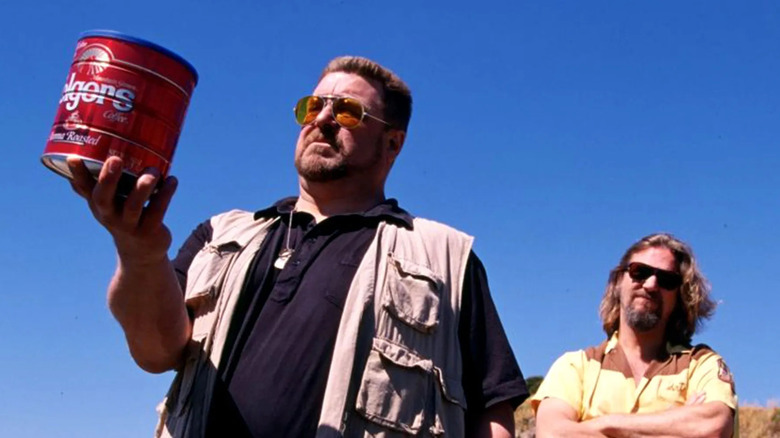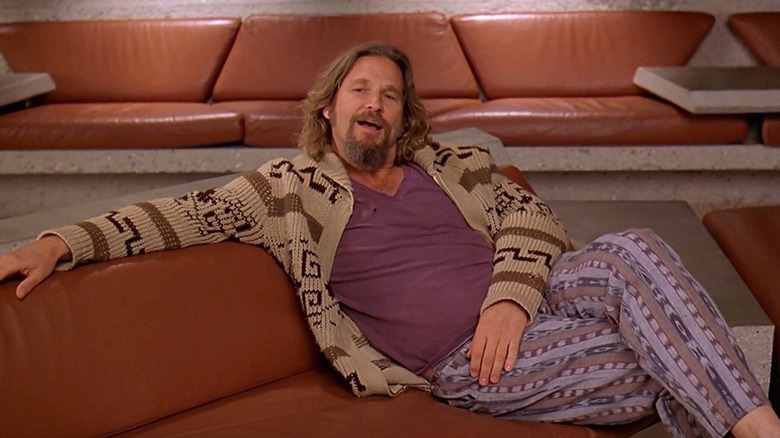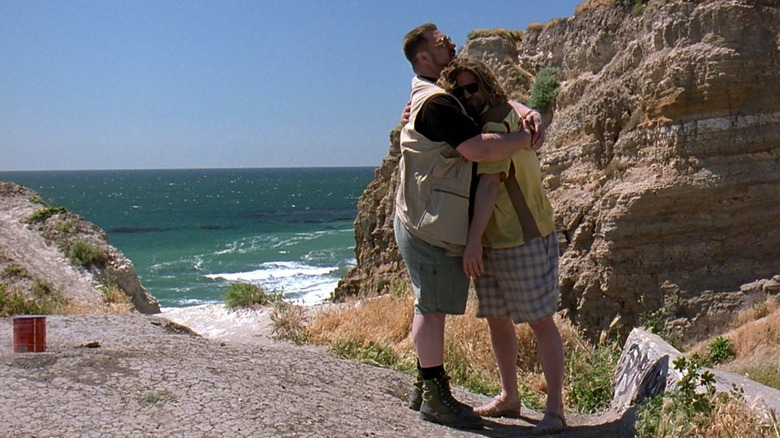The Best Moment In The Big Lebowski Ties The Whole Movie Together
It's a small moment, but it's really the moment that puts the Coen Bros.' 1998 film "The Big Lebowski" — celebrating its 25th anniversary this week — into perspective. Near the film's end, after its central kidnapping plot has largely been resolved and the German nihilists have been dispatched, the none-too-bright character Donny (Steve Buscemi) unexpectedly suffers a heart attack and dies. He is cremated, and his best friends Walter (John Goodman) and Jeff "The Dude" Lebowski cannot afford the expensive urn required to transport his cremains away from the mortuary. They, instead, pack Donny up in a coffee can.
Walter and the Dude go up to a bluff overlooking the Pacific Ocean. Walter mentions that Donny liked to surf (an interest heretofore unknown about Donny) and that his death could be compared to all his buddies who died in Vietnam. Walter, throughout "The Big Lebowski," repeatedly evokes the Vietnam War, constantly stressing that he is a veteran while he extracts handguns in public. Walter, while giving his eulogy, gets a little carried away with his own personal crap. Walter then upturns the coffee can, and the ocean breezes immediately blow Donny's ashes away from the sea, and all over the Dude.
The Dude, in a rare show of outrage, finally yells at Walter, saying that everything he does is a travesty. "What the f*** does anything have to do with Vietnam!?" he yells. This line reveals what is really at the heart of "The Big Lebowski." It is a movie about fossilized characters, trapped in another era. The film was made in 1998 and is set in 1991, both times when it felt like American history was at an end. The characters in "The Big Lebowski" are obsessed with looking back.
They usually find nothing there.
The end of history
It's important to recall a pervasive attitude that persisted throughout a lot of 1990s popular culture. After the fall of the Berlin Wall, and the start of an enormous economic boom, America began to gaze inward and was a little terrified with what it saw. There was, all of a sudden, no more decades-long Cold War hanging over the heads of the citizenry. There was no longer an Enemy to fear. And with no Enemy to Stand United against, many Americans felt that the nation no longer had a unifying, generational identity. There's a reason why the generation of the 1990s was called Generation X. They had no name. They had no unity. And how sad was it, the found, that America required hatred and suspicion of other nations to unify it?
The characters in "The Big Lebowski" are not Gen-Xers, but Boomers. The Dude recalls the 1960s with halcyon joy, carrying out his shiftless, weed-consuming fantasies into an adulthood that requires nothing of him. On television monitors, George H.W. Bush gives speeches about Saddam Hussein and his invasion of Kuwait, but the Dude can hardly acknowledge it. This war does not spark the moral outrage of a previous generation's war. This war (already seen from 1998's perspective) is a floundering attempt by politicians to assert dominance. The Dude writes a check for 69 cents while Bush blithers. The so-called glory of unifying war efforts are long past.
Late in the film, the Dude repeats Bush's words by saying "This aggression will not stand." In the Dude's mouth, is sounds absurd. There is no aggression in Jeff Lebowski's heart. He's too busy bowling and getting high.
America, vis-à-vis war
Walter, a Vietnam veteran, also lives in a nostalgic haze, although for a former soldier, he comes at war from an opposite perspective. He pounds his fists and waves guns around, thinking that a soldier's aggression is an acceptable way of expressing outrage. Walter has, in his mind, reconstructed the world so that it is seemingly always making demands from him. His ex-wife's dog, his ex-wife's faith, and his past all require him to be outraged and active. But it is all in a self-imposed manner. In real life, like the Dude, the world demands very little of Walter.
As such, The Dude and Walter cling to each other in mutual ineffectuality. The Dude may have been roped into a Raymond Chandler-like mystery about a kidnapping and ransom, but the film's central joke is that he's not focused enough to properly play detective. It's telling that the Dude was hired to be a fall guy, and that none of the mystery is revealed as a result of his actions. He and Walter must face the fact that a modern America has no center, and their old ways of protest and/or combat have long since been needed.
"What the f*** does anything have to do with Vietnam?" Nothing at all, Jeff. As Walter tries brushing Donny's ashes from the Dude's body, they awkwardly embrace, alone on a small bluff in Southern California. They don't know what the world has grown into — their perceptions don't extend that far — but they do know that they can cling on to each other. Donny is gone, but there is one thing left that Walter and the Dude can do: abide. They can only persist, bringing their old-world energy into a world that barely remembers it.


